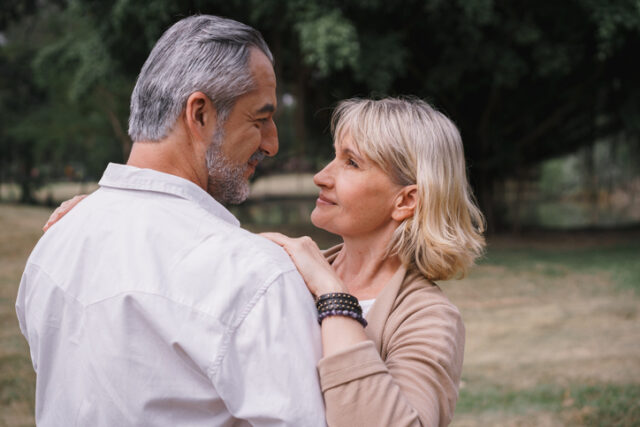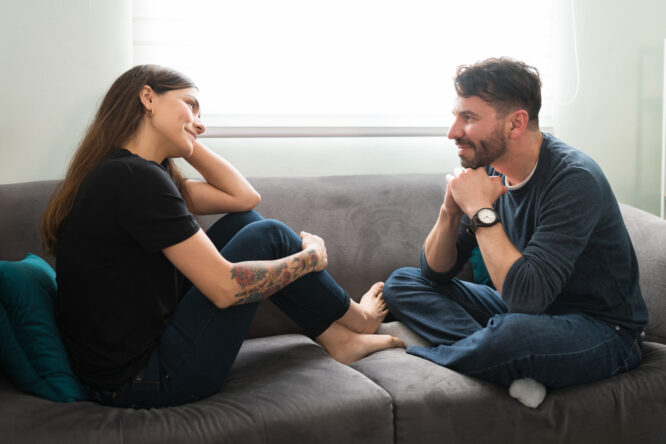Codependency doesn’t tend to develop in a relationship on day one.

It creeps in slowly, disguised as love, loyalty, or simply being the one who “cares more.” As time goes on, though, the relationship stops feeling mutual. You give more than you get. You feel responsible for someone else’s mood, choices, or chaos—and slowly, you start to disappear in the process. These signs can help you spot what’s really going on, and how to start getting yourself back.
1. You feel responsible for their emotions.

If they’re upset, you feel like it’s your fault. If they’re having a bad day, you drop everything to try to fix it. Their mood becomes your responsibility—and you feel guilty if they’re not okay. That deep emotional enmeshment feels caring, but it definitely destroys your own sense of peace. You end up walking on eggshells just to avoid setting them off.
2. You apologise for things that aren’t yours.

They get angry? You say sorry. They mess up? You still feel bad. Over your time together, you’ve learned to take blame even when it’s not yours, just to keep the peace or prevent conflict from escalating. Codependent dynamics twist your sense of responsibility until everything feels like it lands on you. That constant over-apologising eats away at your self-respect.
3. Your needs always come last every single time.

You might tell yourself you’re just “low-maintenance,” but really, you’ve just stopped asking for what you need. You convince yourself their priorities are more urgent, or that asking would feel selfish. The problem is that needs don’t disappear just because you downplay them. They fester, and when they’re constantly ignored, resentment and burnout follow.
4. You can’t relax unless they’re okay.

Even on your best days, if they’re upset, you feel off. You monitor their mood constantly, trying to anticipate what they’ll need before they even ask. Your nervous system is tuned into their signals more than your own. This isn’t love, it’s hypervigilance—and it keeps you trapped in a cycle of anxiety disguised as devotion.
5. You’ve lost sight of who you are outside the relationship.

Your hobbies have faded. Your social life shrank. Even your opinions seem to soften depending on what they believe. It’s not that you changed—it’s that you’ve been slowly adapting just to keep things “good.” Codependency often steals your identity in pieces. You don’t even realise it’s happening until someone asks, “What do you want?” and you genuinely don’t know.
6. You’re scared to set boundaries.

Maybe they guilt you. Maybe they blow up. Maybe they freeze you out until you “come around.” Either way, saying no doesn’t feel safe—it feels like you’re threatening the entire relationship. This fear of boundaries is a huge red flag. Love shouldn’t depend on how agreeable or accommodating you are. If it does, it’s not love—it’s control.
7. You feel like the ‘giver’ and they’re the ‘taker.’

You’re always the one adjusting, managing, fixing. They get the benefit of your care, but rarely return it. And when you finally ask for something, they either dismiss it or make you feel dramatic for needing it. Relationships are never 50/50 all the time, but if it’s always one-sided, you’re not being partnered—you’re being drained.
8. You over-function so they don’t have to.

You manage the appointments, the bills, the plans, the mess—while they get to “just be.” You’ve taken on their share of emotional labour, often without even realising it. Eventually, this becomes your norm, and if you ever stop, everything crumbles because they’ve become dependent on you doing more than your share.
9. You defend their behaviour even when it hurts you.

They’re stressed. They’ve had a tough life. They didn’t mean it. You’ve got a reason for every time they cross a line, and none of those reasons include your own right to be treated well. Codependent patterns often keep you stuck in justification loops. You’d rather rationalise the pain than confront the fear of what would happen if you set a boundary or walked away.
10. You feel guilty when you put yourself first.

Even small things—like taking time alone, saying no, or asking for space—come with an internal tug-of-war. You know it’s reasonable, but the guilt still creeps in. That’s not love. That’s conditioning. And it’s often the result of a dynamic where self-sacrifice has been normalised—and expected.
11. You’re constantly seeking their validation.

Their praise hits different. When they’re proud of you, you light up. When they’re cold or distant, you crash. Your self-worth feels tied to their opinion, and without their approval, you feel small. This dependency makes it hard to trust yourself. You’re not just loving them—you’re using their response to decide how you’re allowed to feel about yourself.
12. You can’t imagine leaving, even if you’re unhappy.

You’ve thought about it, maybe more than once. However, the idea of being without them feels scarier than being unhappy with them. You tell yourself it’s just a phase. That it’ll get better. That you just need to try harder. This is often the heartbreak of codependency—you stay not because it’s good, but because you’ve tied your entire sense of self to their presence.
13. You find yourself lying to other people about the relationship.

You downplay the bad parts. You exaggerate the good ones. You avoid telling the full truth, because deep down, you know other people might tell you what you’re not ready to hear. That secrecy isn’t just about privacy. It’s about survival. Because if the outside world sees the cracks, you might be forced to confront them too.
14. You worry that they’ll fall apart without you.

Maybe they’ve said it. Maybe you’ve just assumed it. Either way, part of you believes you’re the glue holding their life together. That makes leaving—or even pulling back—feel cruel. This isn’t connection, it’s emotional caretaking. The fear of what might happen to them keeps you stuck, even if it’s destroying you in the process.
15. You don’t feel safe telling the truth.

Whether it’s your feelings, your needs, or something that upset you—you filter. You shrink it. You avoid it. Because the cost of being honest feels too high. This isn’t a communication issue; it’s a power imbalance. In healthy relationships, honesty might be hard, but it’s never dangerous.
So… how do you get out of it?

Start by noticing where your fear is driving your choices. Build space—whether that’s emotional distance, a bit of reflection, or time alone to reconnect with yourself. Relearn how to check in with your own needs. Therapy helps. So does honest conversation with people outside the dynamic.
Codependency doesn’t mean you’re weak. It means you learned to survive through closeness. But healing means remembering that you’re allowed to exist without being everything for someone else. You’re allowed to choose yourself—fully, bravely, and without apology.




